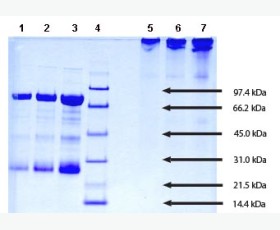Recombinant Human PI3K-Interacting Protein 1/PIK3IP1
| Product name: | Recombinant Human PI3K-Interacting Protein 1/PIK3IP1 |
| Source: | Human Cells |
| Purity: | Greater than 95% as determined by reducing SDS-PAGE. |
| Buffer Formulation: | Lyophilized from a 0.2 μm filtered solution of 50mM TrisHCl,10mM reduced Glutathione,PH8.0. |
| Applications: | Applications:SDS-PAGE; WB; ELISA; IP. |
| Storage: | Avoid repeated freeze/thaw cycles. Store at 2-8 oC for one month. Aliquot and store at -80 oC for 12 months. |
| UOM: | 100ug/50ug/200ug/1mg/1g |
| Source | Human Cells |
| Description | Recombinant Human PIK3IP1 is produced by our Mammalian expression system and the target gene encoding Ser22-Thr168 is expressed with a 6His tag at the C-terminus. |
| Names | Kringle domain-containing protein HGFL, PIK3IP1, HGFL |
| Accession # | Q96FE7 |
| Formulation | Lyophilized from a 0.2 μm filtered solution of 50mM TrisHCl,10mM reduced Glutathione,PH8.0. |
| Shipping |
The product is shipped at ambient temperature. |
| Reconstitution |
Always centrifuge tubes before opening. Do not mix by vortex or pipetting. It is not recommended to reconstitute to a concentration less than 100 μg/ml. Dissolve the lyophilized protein in ddH2O. Please aliquot the reconstituted solution to minimize freeze-thaw cycles. |
| Storage |
Lyophilized protein should be stored at < -20°C, though stable at room temperature for 3 weeks. Reconstituted protein solution can be stored at 4-7°C for 2-7 days. Aliquots of reconstituted samples are stable at < -20°C for 3 months. |
| Purity |
Greater than 95% as determined by reducing SDS-PAGE. |
| Endotoxin | Less than 0.1 ng/µg (1 IEU/µg) as determined by LAL test. |
| Amino Acid Sequence |
SGGCFWDNGHLYREDQTSPAPGLRCLNWLDAQSGLASAPVSGAGNHSYCRNPDEDPRGPWCYVSG EAGVPEKRPCEDLRCPETTSQALPAFTTEIQEASEGPGADEVQVFAPANALPARSEAAAVQPVIG ISQRVRMNSKEKKDLGTVDHHHHHH
|
| Background | Phosphoinositide-3-kinase-interacting protein 1(PIK3IP1) is an enzyme that in humans is encoded by the PIK3IP1 gene.It is a negative regulator of phosphatidylinositol-3-kinase (PI3K), suppresses the development of hepatocellular carcinoma. The gene encoding PIK3IP1 maps to human chromosome 22, which houses over 500 genes and is the second smallest human chromosome. Mutations in several of the genes that map to chromosome 22 are involved in the development of Phelan-McDermid syndrome, Neurofibromatosis type 2, autism and schizophrenia. |














